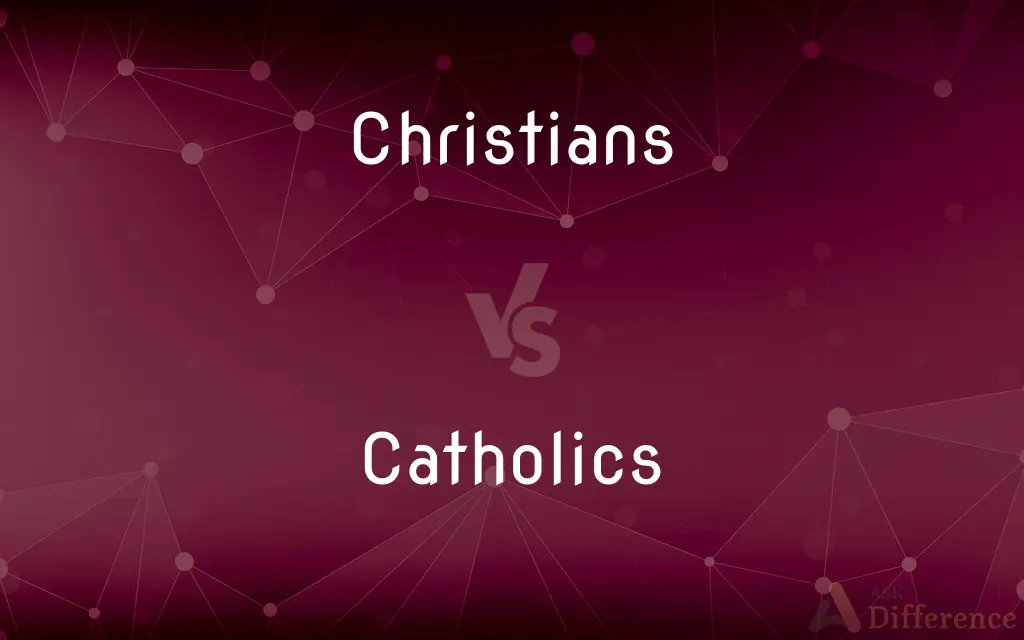Christians vs. Catholics — What's the Difference?
By Tayyaba Rehman — Published on December 12, 2023
Christians are followers of Jesus Christ and His teachings, while Catholics are Christians specifically following the Roman Catholic Church's doctrines. All Catholics are Christians, but not all Christians are Catholics.

Difference Between Christians and Catholics
Table of Contents
ADVERTISEMENT
Key Differences
Christians, by broad definition, are individuals who believe in and follow the teachings of Jesus Christ. They adhere to the central tenets of Christianity, accepting Jesus as their Savior and recognizing the Holy Bible as a significant religious text. Conversely, Catholics are a subset of Christians, adhering to the teachings and practices specific to the Roman Catholic Church, which has its spiritual leadership centered in the Vatican under the Pope.
The term "Christian" encompasses a wide range of denominations and sects, including Baptists, Lutherans, Methodists, Pentecostals, and many more. Each of these denominations has distinct theological interpretations and practices. On the other hand, Catholics have a unified set of beliefs and practices guided by the Vatican, the Catechism, and the Pope, who is considered the supreme spiritual authority for Catholics.
Christians base their beliefs on the Holy Bible, which includes the Old and New Testaments. While Catholics also revere the Bible, they supplement its teachings with various church traditions and the Apocrypha – additional books not found in Protestant versions of the Bible. Moreover, the sacramental system, including the Eucharist and confession, holds central importance in Catholic worship.
Historically, the split between Christians of the Catholic tradition and those of Protestant denominations occurred during the Reformation in the 16th century. The Reformation, led by figures like Martin Luther, questioned specific Catholic practices and doctrines. While both groups, Christians at large and Catholics, share a foundational belief in Jesus Christ, their practices, rituals, and certain theological positions can differ significantly.
Comparison Chart
Basis of Faith
Believe in Jesus Christ and His teachings.
Follow Roman Catholic Church's teachings and practices.
ADVERTISEMENT
Denominations
Encompasses various denominations (e.g., Baptist, Lutheran).
Unified under the Roman Catholic Church.
Scriptural Reference
Holy Bible (Old and New Testaments).
Holy Bible plus Apocrypha and Church traditions.
Spiritual Leadership
Varies by denomination.
Led by the Pope and the Vatican.
Historical Division
Can trace back to early followers of Christ.
Significant split during the Reformation in the 16th century.
Compare with Definitions
Christians
Believers in the doctrines of Christianity as outlined in the Holy Bible.
Christians uphold the Ten Commandments as foundational moral guidelines.
Catholics
Members of the oldest continuous Christian institution.
Catholics trace their Church's history back to St. Peter, considered the first Pope.
Christians
Followers of Jesus Christ and His teachings.
The Christians gathered for Sunday worship to celebrate their faith.
Catholics
Christians under the spiritual authority of the Pope and the Vatican.
Catholics recognize the Pope as their highest spiritual leader.
Christians
Members of various denominations unified by the belief in Christ.
Christians from different backgrounds came together for the interdenominational conference.
Catholics
Followers of the Roman Catholic Church and its doctrines.
The Catholics attended Mass at the local cathedral on Sunday.
Christians
Professing belief in Jesus as Christ or following the religion based on the life and teachings of Jesus.
Catholics
Adherents of a tradition with sacraments like Eucharist and Confession.
Catholics believe in the real presence of Christ in the Eucharist.
Christians
Relating to or derived from Jesus or Jesus's teachings.
Catholics
Believers in the combined teachings of the Bible, Apocrypha, and Church traditions.
Catholics reference the Catechism for guidance on moral and spiritual issues.
Christians
Manifesting the qualities or spirit of Jesus, especially in showing concern for others.
Christians
Relating to or characteristic of Christianity or its adherents.
Christians
One who professes belief in Jesus as Christ or follows a religion based on the life and teachings of Jesus.
Christians
One who lives according to the teachings of Jesus.
Christians
Plural of christian
Christians
Individuals professing faith in the salvation offered by Jesus.
Christians believe in the resurrection of Jesus and eternal life.
Christians
Adherents of the world's largest religion, based on followers.
Christians are spread across continents, reflecting diverse cultures and traditions.
Common Curiosities
Who are Christians?
Christians are followers of Jesus Christ and His teachings.
What Bible do Christians use?
Christians typically use the Holy Bible, which can vary slightly among denominations.
Are the core beliefs of Christians and Catholics similar?
Yes, both believe in Jesus Christ's teachings, but they differ in rituals, practices, and certain theological aspects.
Do Catholics have additional scriptures besides the Bible?
Catholics recognize the Apocrypha and various Church traditions alongside the Holy Bible.
Who is the leader of the Catholics?
The Pope, based in the Vatican, is the spiritual leader of Catholics.
Is the Christian Bible different from the Catholic Bible?
The core is similar, but the Catholic Bible includes the Apocrypha, not found in many Protestant Bibles.
What distinguishes Catholics from other Christians?
Catholics specifically follow the teachings and practices of the Roman Catholic Church.
Why did the split between Catholics and some other Christians occur?
The significant split, known as the Reformation, took place in the 16th century over theological and practice differences.
Are all Catholics considered Christians?
Yes, all Catholics are Christians, but not all Christians are Catholics.
What are the sacraments in the Catholic Church?
Catholics recognize seven sacraments, including Baptism, Eucharist, and Confession.
What's the significance of the Eucharist in the Catholic Church?
Catholics believe in the real presence of Christ in the Eucharist, making it central to their worship.
How diverse are Christian denominations?
Very diverse, including Baptists, Methodists, Lutherans, Pentecostals, and many more.
How often do Christians attend worship services?
It varies, but many Christians attend weekly services, with some denominations also holding mid-week services.
Do Catholics venerate saints?
Yes, Catholics venerate saints and believe they intercede with God on behalf of believers.
Can Christians of different denominations worship together?
Yes, many ecumenical services allow Christians of different backgrounds to worship together.
Share Your Discovery

Previous Comparison
Potato Puree vs. Mashed Potatoes
Next Comparison
Convergent Evolution vs. Divergent EvolutionAuthor Spotlight
Written by
Tayyaba RehmanTayyaba Rehman is a distinguished writer, currently serving as a primary contributor to askdifference.com. As a researcher in semantics and etymology, Tayyaba's passion for the complexity of languages and their distinctions has found a perfect home on the platform. Tayyaba delves into the intricacies of language, distinguishing between commonly confused words and phrases, thereby providing clarity for readers worldwide.












































